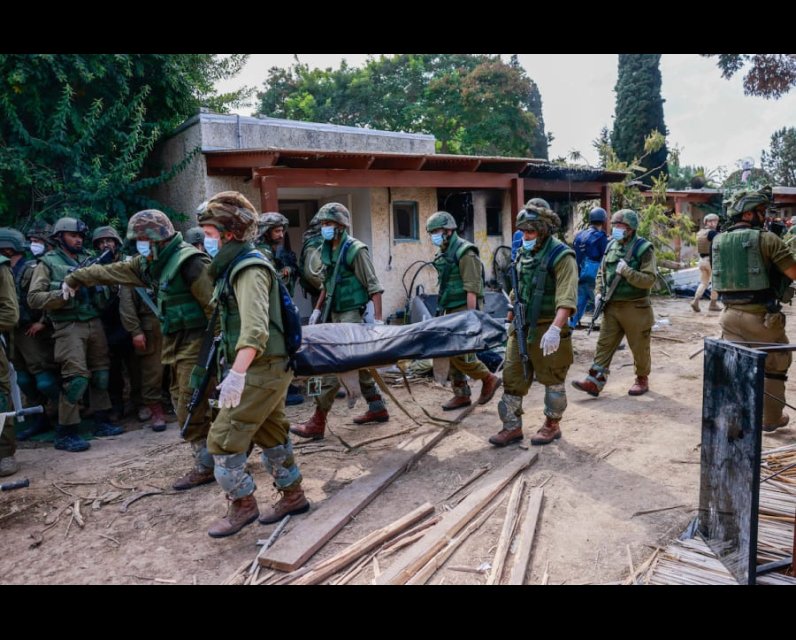Unpublished Opinions
Stefan Klietsch grew up in the Ottawa Valley outside the town of Renfrew. He later studied Political Science at the University of Ottawa, with a Minor in Religious Studies. He ran as a candidate for Member of Parliament for Renfrew-Nipissing-Pembroke three times from 2015 to 2021. He recently graduated with a Master of Arts in Political Science at the University of Carleton.
Barbarism by Hamas more of an immediate priority for condemnation than Israeli apartheid

Image credit to All Israel News.
Timing and context are relevant for persuasive or effective condemnation
Morality and ethical behaviour in international relations are hardly ever black-and-white. Anyone looking for a country or multinational organization which is pure of heart and never of moral failing is bound to be in for a disappointment. However, some countries and factions on the world stage clearly are on worse shades of moral grey than others, and the tone and rhetoric of our societies should prioritize our condemnation accordingly.
Which is why it is a shame that many hundreds of “pro-Palestine” activists gathered in Toronto and other major Canadian cities on Thanksgiving Monday, right after the accumulation of fresh corpses from the ongoing murder rampage of Hamas against Israelis on the weekend. CBC News reported that some of the protesters in question denied being supporters of Hamas’ brutality. To quite from one demonstrator,
"It's not a question of whether we support the attacks. It's a question of what do we stand against," said Yara Shoufani, with the Toronto chapter of the Palestinian Youth Movement, which organized the event. The organization says on Instagram that it's a grassroots, independent movement "struggling for the liberation of our homeland."
"We are here again in support of the Palestinian people, the Palestinian nation, across all walks of life inside of Palestine, outside of Palestine, in the refugee camps, all across the world that is fighting to return home."
Liberation of Palestine is surely a worthy goal, but the context here makes the sentiment in poor taste. The unfortunate subtle undertone here is, “Now that Israel has been freshly humiliated with the mass-murder of its citizens in a music festival and elsewhere, now that it fears for the safety of its hundred citizens taken as hostages, now is precisely the time to pressure Israel to change its policies!” Absolutely not!
There is plenty to condemn in Israeli violence, but…
Of course, there is plenty enough to lament and condemn in the behaviour of the Israeli state. Israeli society recently underwent some degree of polarization due to proposed judicial reforms by the Benjamin Netanyahu government. The context of these proposed changes was that Israel lacks a written constitution, and that therefore legal changes putting elected officials beyond judicial scrutiny is of ambiguous legitimacy. What kind of real democracy lacks a written constitution?
I do not have the expertise to thoroughly assess the full historical context behind the policies of the Israeli state. But suffice to say, Israel has been imposing a system of civil apartheid for Palestinians, including building of illegal settlements in the West Bank. Much ink has been spilled about the longstanding violence by the Israeli state, including but not limited to repeated condemnation by human rights organizations. Some notable incidents of Israeli state violence include the shooting of Canadian doctor Tarek Loubani, the shooting of Palestinian-Canadian Rehab Nazzal, the killing of American activist Rachel Corrie by an Israeli bulldozer, and the killing of Al Jazeera reporter Shireen Abu Akleh.
Then there are the thousands of Palestinians who have been killed in Israeli military operations over the decades. It is a recurring trend that where Israel retaliates against violence towards its citizens, more Palestinian citizens inevitably are killed in the retaliation than are Israelis in the inciting incident. One could reasonably argue that the Israeli state puts a much higher premium on Israeli life than on Palestinian life, and surely the Toronto protesters do not want the same trend to continue.
Yet despite all that, in the immediate circumstances of the current conflict, violence by Hamas needs to be specifically singled out. The Israeli military aim of squashing Hamas deserves firm support.
Restraint should be urged of Israeli tactics and methods, without demonization
Of course, support for Israel is warranted in the face of its national trauma, the fastest one-day killings of Jews since the end of the Holocaust. Though critics do have a point that such support need not translate into unflinching support of Israeli military methods. What critics of Israel have no merit in asserting, however, is that planned Israeli bombings and blockades of Gaza amount to “genocide”.
The g-word has become overly politicized in recent years, become a justification for self-serving chest-beating, and used in times and places where modestly tamer descriptors would have been sufficient. For example, Putin’s Russia has been accused of committing “genocide” of Ukrainians, whereas the more plausible truth is that Putin’s Russia is “only” guilty of attempting to enslave Ukrainians to the Russian imperial project (which is still exceptionally evil regardless). And Israel could be accused of enslaving Palestinians in the West Bank, by virtue of illegally stealing land in which Palestinians have past laboured.
But the ongoing violence against the homes of Gazans is the product of a two-sided conflict, not the outcome of a dominant power attempting to impose an ethnic cleansing for the sake of ethnic cleansing. And while it is deeply unfair for Gazans to be forced to flee their homes after warning from the Israeli military of imminent attacks, and for Gazans to be killed who lack the time or means to flee their homes, it is equally unfair to expect Israeli citizens to remain sitting ducks to await further butchery by Hamas. And there is consequently a necessary obligation of critics of Israel to constructively suggest an alternative military means for Israel to prevent Hamas violence, rather than effortlessly ignore the security reasons for the Israeli blockades and bombings.
Yet in the minds of critics of Israel, some whom I know personally, they have already offered such suggestions. For example, Greek-Canadian activist lawyer Dimitri Lascaris writes, “If Israel’s leaders had had the foresight and humility to grasp that U.S. dominance could not endure forever, they would have made peace with Palestinians long ago on favourable terms... They repeatedly squandered opportunities for peace on favourable terms, because they wanted it all.” The Canadian author and activist Yves Engler similarly concurs, “In our upside-down world of mainstream politics, the oppressed daring to fight back against their much more powerful oppressor are designated criminals.” These critics are well-informed enough in their criticisms of the Israeli state that arguably the Israeli state should implement at least some of their demanded policy changes. But any suggestion that violence by Hamas would end the day that Dimitri and Yves hypothetically get their way, on every desired change in Israeli policy, is deeply naive.
The unpredictability and unbounded nature of Hamas’ cult of violence
Israeli violence across the decades has been consistent, but it has also been relatively predictable. If you want to avoid Israeli violence, you can be submissive to the whims of Israeli security apparatus and the Israeli state will generally attempt to spare you. Of course, there have been many unfortunate exceptions to this general rule, given the countless Palestinians who have died in Israeli reprisals of no fault of their own, including in strikes that arguably defy the Geneva Convention. But a large share of these deaths is as much the fault of Hamas fighting out-of-uniform with human shields, thereby blurring the civilian-military distinction, as the fault of Israeli policy.
And in accounting for moral agency, predictability of the actors involved matters. If it was irresponsible for Israel to continue its lawless settlements in the West Bank, knowing full well that there would be a violent righteous response at some unknown point of time, it was even more irresponsible for Hamas to kill many Israelis and take many hostages in a surprise attack, knowing from experience that the Israeli state would surely respond in imminent reprisals that would kill some number of Palestinian citizens. So, there can be no illusion that Hamas expected or intended to achieve any kind of “liberation” with its attacks on Israel.
Hamas is by its very structure and purpose a death cult. Even considering its recent renunciation of the indiscriminate anti-Jew hatred of its original 1988 Charter, Hamas retains a diffused leadership structure that defies any transparent public accountability. So even if there was the political will for the Israeli state to become suddenly much more compromising to Palestinian interests, there would be no reliable means for the Israeli state to negotiate in good faith with Hamas, given uncertainty that Hamas figures involved in the negotiations can definitively call off further Hamas violence.
Any achievement of a long-lasting and overdue long-term peace between Israel and Palestine is going to depend upon a two-sided reckoning and reconciliation. But our priorities should be clear: constraining and containing the death cult is the most urgent priority and the most fundamental condition for political negotiation of any kind.



Comments
Be the first to comment